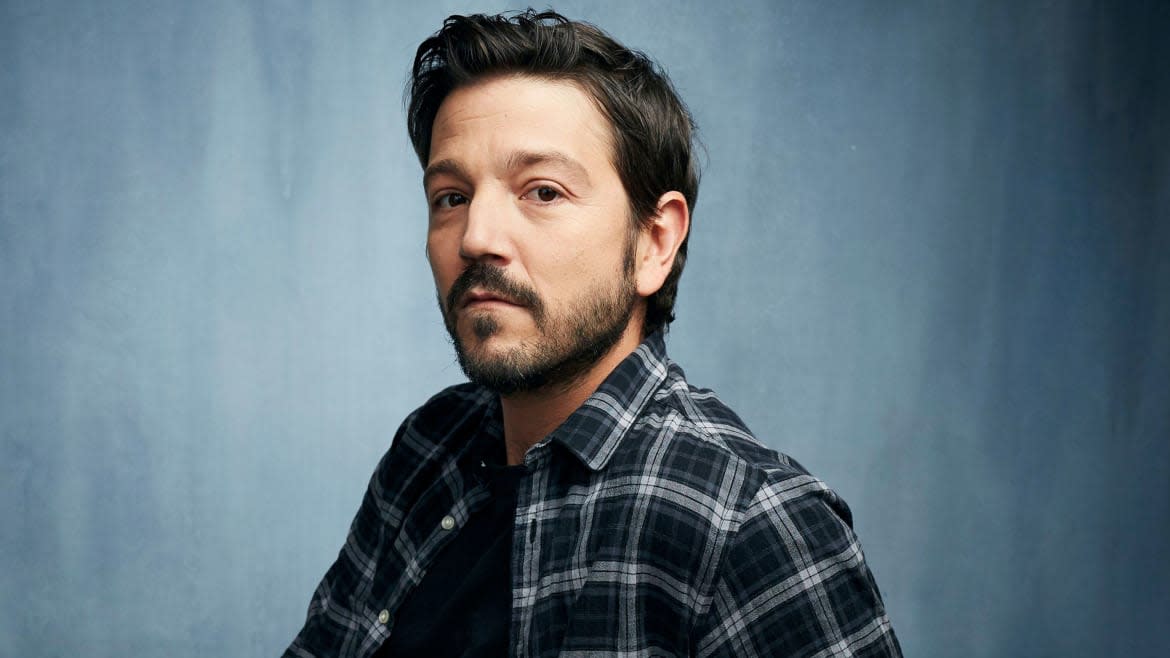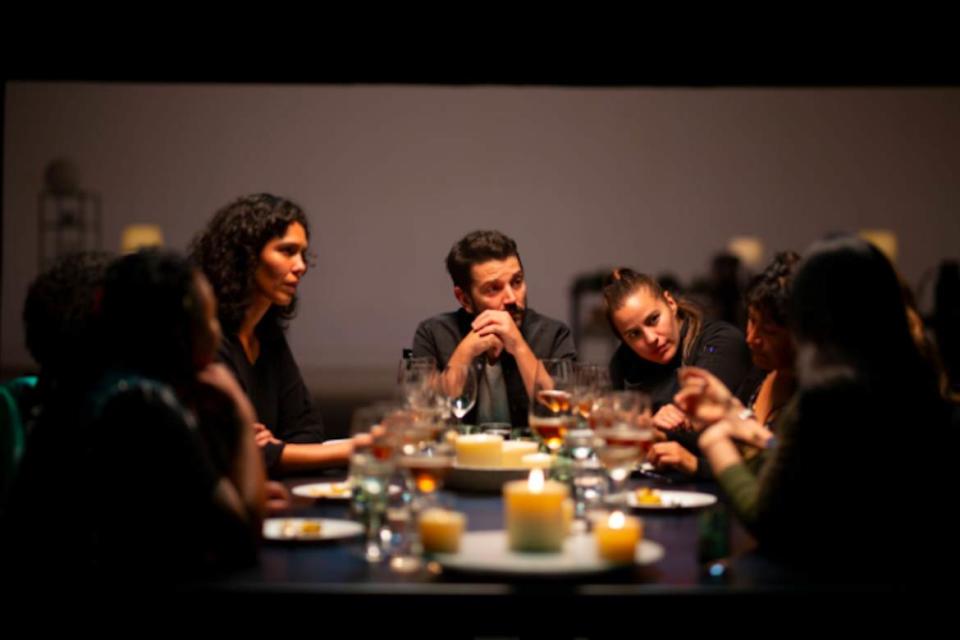Diego Luna Doesn’t Want to Waste His Time With ‘Toxic’ Trump

Garnished with sharp points of view and organic debate, Diego Luna’s dinner conversations in his new Amazon Studios show Pan y Circo (Bread and Circus) take a stab at dissecting some of the most contentious issues of our time. For each episode, the famed Mexican actor, director, and producer enlisted one of his homeland’s top chefs to prepare inspired dishes for his illustrious guests—all of whom were handpicked per topic—to savor.
Food in this context functions not as the main entree, but as a tasty icebreaker giving way to civil, yet always impassioned exchanges on migration, xenophobia, climate change, gender violence, and abortion. From the collection of table discussions, privilege emerges as a pungent through-line exposing our biases and blind spots: the privilege of being male in patriarchal societies, the privilege to cross the border legally, the privilege of being white in a racist country, or the privilege to use drugs recreationally.
“We, humanity, are not willing to sacrifice the benefits that come with privilege,” says Luna, speaking from Mexico. In his mind, the COVID-19 crisis has evidenced what we always knew: that we tend to only do things for the collective good when we are forced to and when our own survival is at stake—and even then the worst of our individualism proliferates. Still, he believes, even if it was by imposition, our current reality proves change is possible.
Why Conservatives Like Ben Shapiro Are Triggered by Cardi B and Megan Thee Stallion’s ‘WAP’
Fake Jeffrey Epstein Flight Logs Lead QAnon Crazies to Target Chrissy Teigen and Beyoncé
“This virus has taught us that we can actually do certain things in terms of climate change that according to us were impossible, unthinkable, like halting certain industries, stop traveling, thinking local,” he explains. “A tiny bug had to come and tell us, ‘Look, you really can do it. If it’s about survival, you can do it. That reflection shouldn’t just apply in relation to our impact on the environment, but we should take it to the most intimate topics.”
Luna, who produced the topical series through his and Gael García Bernal’s company La Corriente del Golfo, hopes that everyone uses this global reset to ask themselves some introspective questions about how we relate to those around us and whether our relationships with them are fair or based on an unjust power dynamic. Simply reflecting on these personal interactions, he argues, immediately improves our collective understanding of one another, and may lead people to action.
“In this historic moment we are living through, it’s our duty not to return to the same things we were doing before. The pandemic has highlighted those things that we should really be working on,” he adds.
For Luna, the process of investigation and self-interrogation while making Pan y Circo confronted him with his own responsibility in the centuries-old oppression and erasure of indigenous communities and Afro-Mexicans in his country. Episode seven, on identity and racism, provides a blunt examination of the indelible remnants of colonialism that have shaped what aspects of the culture are exalted (European) and what’s dismissed (indigenous and Black).
“I’ve benefited from a racist system my whole life. Not only do we have to renounce those benefits but first we need to be conscious of them. That’s a part of reality that I had decided not to see,” Luna solemnly notes. “I don’t have answers right now, but at least I’m already asking myself the questions. And I think that’s a good first step.”
As one of Mexico’s most internationally renowned talents, Luna’s career and political views are under incessant online scrutiny. One major point of controversy in recent years was his decision to participate in the Netflix show Narcos: Mexico, where he plays cartel leader Miguel Ángel Félix Gallardo. With Pan y Circo including an episode on drug legalization and its ramifications, criticisms have reawakened on social media.
But despite what detractors may interpret as a hypocritical move, for Luna neither the character nor the project as a whole simplistically glorify the carnage Mexico has intensely suffered for the larger part of the 21st century. His interest as an actor came from the emotional and intellectual complexity the material possesses, and thus the choice to accept the role was in line with his values.
“If I analyze my life, it’s hard for me to think about success if it doesn’t go hand in hand with congruence and personal satisfaction, which means what I learn, how I grow, what happens to me in the process of making it. That’s indispensable for me,” says Luna. “You have to tell stories because of your own curiosity. If the motivation is entirely financial or about popularity, you end up betraying yourself and that’s reflected in the result.”
Back in 2014, the same work ethic led him to direct the biographical film Cesar Chavez, starring Michael Peña as the Latino civil rights leader. Through this venture, Luna aimed to bridge the gap he feels exists between Mexican and Mexican-Americans, and to which he feels an intimate connection. “I have a Mexican-American son who was born in Los Angeles. He learned Spanish at home and English at school. I wanted to make a movie that spoke to him about the community to which he belongs, a community which I deeply respect,” he says.

Not surprisingly, the Pan y Circo episode dedicated to migration is one of the most affecting. Memorable among the diners, Mexican-American singer La Marisoul, vocalist of Grammy-winning L.A. band La Santa Cecilia, shares the disheartening experience of not being fully accepted on either side of the border—not being American or Mexican enough. To her point, Luna regrets that both Mexican nationals and Mexican-Americans don’t tend to see each other based on the inherent bonds that link them.
“There’s a great fracture. We have allowed that ideological wall that’s built on prejudices and great fears to truly divide us,” he says. “With a lot of impotence, I see how fragmented we are, how little we help each other, it saddens me because there are many more things that unite us than the ones that divide us.”
Of course, it’s impossible to talk about immigration and division along ideological lines without mentioning the president of the United States. When asked if it’s possible to dialogue with everyone, even someone like Donald Trump, in a setting like the Pan y Circo dinners, Luna’s response was emphatic.

“No. I mean, it could be possible, but I don’t want to waste my time. For me Pan y Circo has to be a space that doesn’t amplify toxic voices, that doesn’t promote ignorance, or selfishness,” he offers. “Ours is a table where guests are willing to connect empathically with those who think differently and give themselves the opportunity to listen and understand the other’s position, maybe not share it, but start with understanding what the other has to say.”
Although differences of opinion are not only tolerated but encouraged at every gathering he hosts, Luna has no interest in providing a platform for violence and hatred.
“It’s not about generating sensationalist clashes. This is not The Jerry Springer Show,” he says candidly. “It’s about combating the polarization that’s happening everywhere, which scares me a lot because there might be a point when that distance we’ve created between each other will be irreparable. That’s very dangerous.”
Get our top stories in your inbox every day. Sign up now!
Daily Beast Membership: Beast Inside goes deeper on the stories that matter to you. Learn more.


